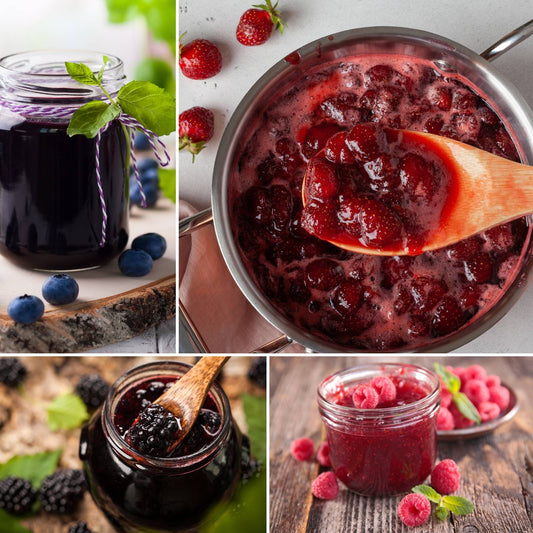Are Strawberries Good for You?

Sat on a gingham blanket, the sun beating down, surrounded by your loved ones and the family dog. You pop a strawberry into your mouth and savour the juicy sweetness. To quote Chandler Bing, could it be any better? It’s hard to think of anything! Mainstays of the British summer, strawberries are one of those fruits that nearly everyone at least likes, and that many people bloomin’ love.
But just how healthy are they? That’s the question we’re going to be answering today, exploring the nutritional benefits of this soft fruit, as well as any major health advantages derived from consuming them.
Jump to:
- How healthy are strawberries?
- The health benefits of strawberries
- Is there any difference between store-bought and homegrown?
How healthy are strawberries?
If we unpack the primary macronutrient makeup of strawberries, we find they’re roughly 90% water, around 8% carbohydrates and the remainder split in small amounts between fat and protein. While this gives us a top-down perspective, if we use information taken from the USDA, we can break things down a bit further.
Strawberries nutrition
If you take 100g of fresh strawberries, which equates to roughly one-quarter of a typical large supermarket punnet, you can expect to find the following quantities of vitamins and minerals.
|
Vitamin/mineral |
Amount |
Proportion of RDA |
|
Vitamin A |
1µg |
0.14% (for men) 0.16% (for women) |
|
Vitamin B6 |
0.047mg |
3.36% (for men) 3.92% (for women) |
|
Vitamin C |
58.8mg |
147% |
|
Vitamin E |
0.29mg |
7.25% (for men) 9.67% (for women) |
|
Calcium |
16mg |
2.29% |
|
Phosphorous |
24mg |
4.36% |
|
Iron |
0.41mg |
4.71% (for men and women over 50) 2.77% (for women) |
|
Magnesium |
13mg |
4.33% (for men) 4.81% (for women) |
|
Potassium |
153mg |
4.37% |
|
Copper |
0.048mg |
4% |
The most notable statistic from the table has to, of course, be the high vitamin C content, with 100g of strawberries easily covering your recommended daily intake. We might associate vitamin C with citrus fruits like oranges and lemons, but these red flavour bombs will offer your immune system a perfect little pick-me-up, too!
Strawberries calories
Like most fruits, strawberries aren’t particularly calorific. In 100g of fresh strawberries, you’ll find just 32 calories – that’s just 1.6% of a woman’s recommended daily calorie intake, and 1.28% of a man’s suggested intake.
Sugars in strawberries
While fruits are undoubtedly very healthy, they can also be pretty high in naturally-occurring sugars; strawberries, however, are actually pretty low in sugar – something their wonderful sweet taste wouldn’t necessarily suggest. In 100g of strawberries, you’ll find only 4.89g, which equates to just 16.3% of an adult’s recommended daily intake.
Compare that with something like seedless green grapes, which have 16.1g of sugar per every 100g – over half of the suggested daily quantity – and you see that strawberries are a better option for people looking to watch their sugar intake.

What are the health benefits of strawberries?
Vitamin C
We’ve already alluded to the high quantity of vitamin C found within strawberries, but why exactly is that beneficial to our health? Well, for one thing it serves as an antioxidant, protecting cells from damage, while its most widely-known advantage is in bolstering the body’s immune system. It does this by enhancing lymphocytic and phagocytic functioning and inhibiting virus replication.
Improved gut health
Consuming strawberries can have a positive effect on your body’s gut health, by increasing the concentrations of gut microorganisms in our intestines, while the dietary fibre housed within each strawberry aids with digestion and bowel movements. They’re even thought to potentially decrease the risk of developing colorectal cancer.
Reduced cardiovascular risk
Another health benefit of eating strawberries is that they can help your heart; a comprehensive study by Harvard Medical School found that those people who ate more berries were at lower risk of heart attack than those that ate little-to-no berries. Their recommendation for the best cardiovascular protection is to eat half a cup (just over 60g to you and I) of strawberries (or blueberries) three times per week.

Is there any difference between homegrown and store-bought strawberries?
From a health perspective, not really. Strawberries bought from the supermarket might have been treated with chemical pesticides or fertilisers, however you can easily circumvent this if you’d prefer by opting for the slightly more expensive, organic option(s) on offer.
From a taste point of view, however, we’d argue there’s a big difference. You just can’t beat the taste of a strawberry you’ve grown yourself. They’re fresher and come with the satisfaction of having grown it yourself (which scientifically makes it ten times tastier… Probably).

Final thoughts
So, in answer to the question – are strawberries good for you? The answer is a resounding yes! While you’re here, why not check out our other articles on fruit healthiness, including lemons, apricots, cherries and plums, to name just a few.
Last updated: 11/06/2025




















